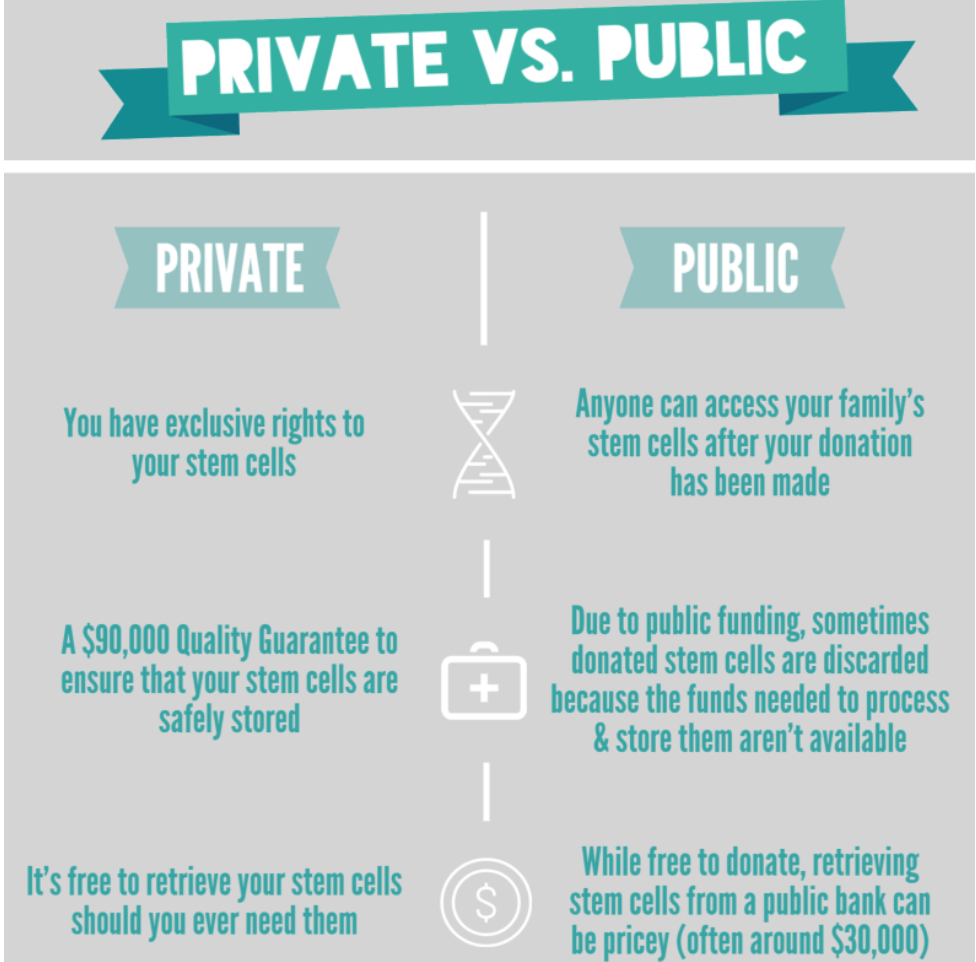Public vs Private Cord Blood Banking: What’s the Difference?
updated March 1, 2022 – Public and private cord banks serve very different purposes. Learn which would be more beneficial to you and your family in Public vs Private Cord Blood Banking: What’s the Difference?
Where should you bank your baby’s cord blood?
After the birth of a baby, the umbilical cord and placenta are typically discarded as medical waste, but if requested, stem cells from the cord blood inside of them can be collected for storage or donation. Stem cells can be used to treat a variety of diseases.
Clearly, it is advantageous to save cord blood stem cells, but it can be confusing to decide where to store them. There are currently two options: public cord blood banks and private cord blood banks. Public and private banks serve very different purposes, and it is important to know which type of bank would be more beneficial to you and your family.
Private Cord Blood Banking
Private cord blood banks allow families to store cord blood stem cells for themselves and their loved ones. They are privately funded, and typically charge a first-year processing fee that ranges from about $1,400 to $2,300, plus annual storage costs of about $115 to $150. Americord offers cord blood banking for a one-time fee of $2,999, which includes 20 years of storage, courier, processing fees.
The pros and cons of private cord blood banking are listed below.
Pros
- You own your baby’s stem cells and therefore you are the only person who can decide who can use them
- Stem cell transplants from a related family member are less likely to be rejected, therefore having your baby’s stem cells available makes it less likely you would have to search for an unrelated donor who is a match
- The success rates of using related cord blood for transplants are twice that of using cord blood from a public donor for transplants
- Most private cord blood banks will pay all of the fees associated with transporting the stored cord blood to the necessary medical facility if it is needed for a transplant
Cons
- There is a fee for collection and storage
- In some cases, there is a risk that the cord blood collected from a baby contains the disease that is being treated, so it cannot be used
If you or your partner has a family history of a disease that is treatable with stem cells, or if a family member is currently in need of a stem cell transplant, private cord blood banking could be the right choice for you.
Public Cord Blood Banking
Public cord blood banks offer free cord blood banking to anyone who meets their donation requirements. They are usually supported by federal or private funding, which is why they can perform these collections at no cost to the family. The pros and cons of public cord blood banking are listed below.
Pros
- Cord blood banking is provided at no cost
- Makes stem cells available to anyone who needs them
- Makes it possible for people in need of a stem cell transplant to search for a match outside of their family
Cons
- You no longer own the stem cells after you donate them, so they may not be available if you or your family ever need them
- Public cord blood banks do not pay the fees associated with transporting the stored cord blood to the necessary medical facility if they are needed for a transplant, so if this is not covered by your insurance, it could be very costly to use stem cells from a public cord blood bank
- 60% of cord blood donations are discarded for not meeting processing and storage requirements[1]
- Not all hospitals work with public cord blood banks, therefore, depending on where you give birth, it may or may not be possible to donate to a public cord blood bank
[1] “Prospective Donor FAQ.” – National Cord Blood Program. N.p., n.d. Web. 12 Oct. 2016.

In addition to cord blood banking, learn more about what to expect when giving birth in a hospital, and potential birth interventions.
Categories
- Archives
- Baby Sleep Advice
- Expert Guides
- Hiring a Night Nanny
- Infant Safety
- Postpartum Health
- Twins & Multiples
